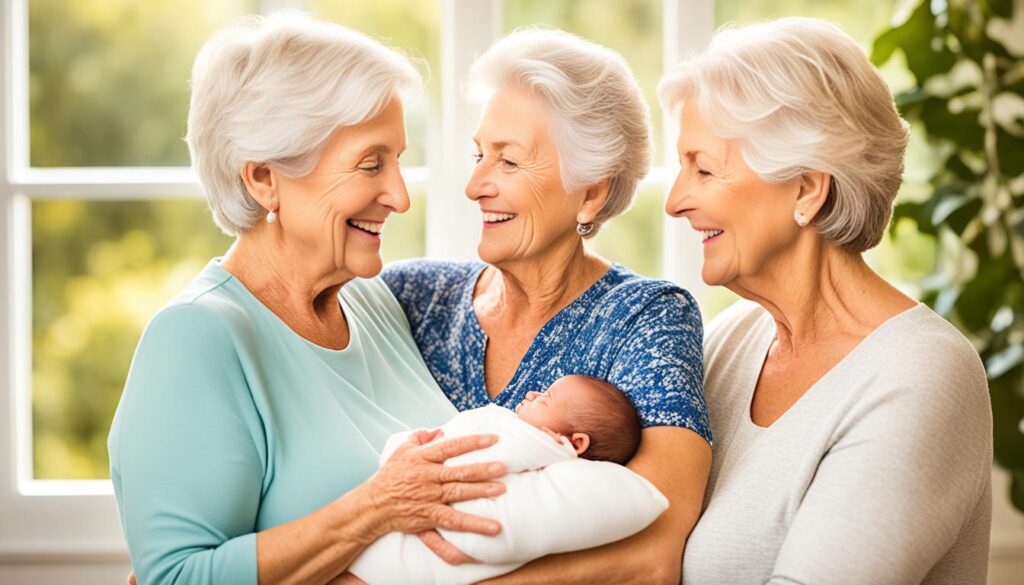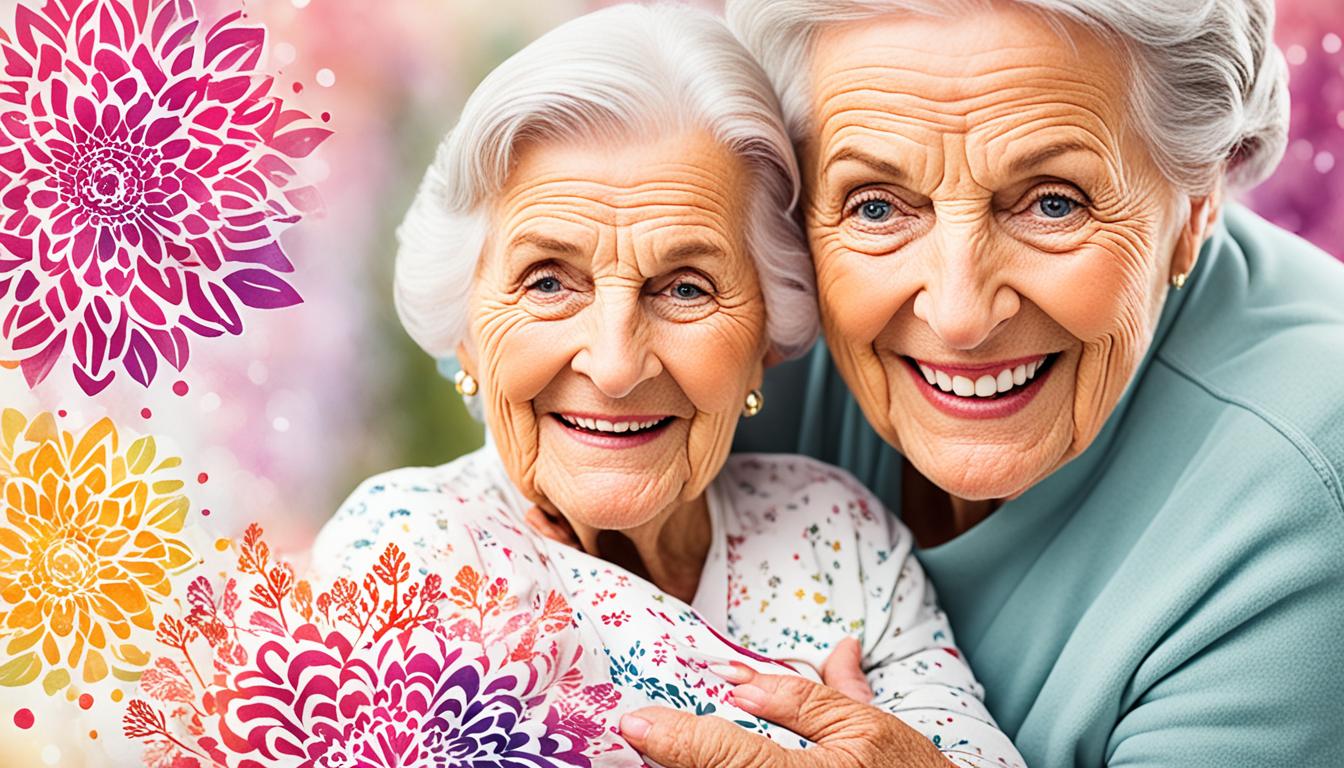Have you wondered why more women are becoming mothers later in life? Is it a personal choice or something more? Let’s explore why this trend of having children later is happening. We often think only the young could be mothers, but that’s not the truth.
Key Takeaways:
- The average age for women giving birth for the first time has been rising over the past 40 years.
- There has been a significant increase in the number of women over 35 having their first children.
- Living near grandmothers may have evolutionary benefits and contribute to the survival and well-being of newborns.
- Cultural context plays a significant role in newborn care, challenging the narrow focus on the mother-child dyad.
- Older mothers face advantages and challenges, and it is important to consider both in discussions on grandma-births.
The Growing Trend of Older Women Giving Birth
Motherhood is changing with the times. More older women are having babies now. This challenges what we thought was the “right” time to start a family.
From 1970 to 2012, birth rates for women 35-39 have risen a lot. Now 11 in 1,000 women have their first child in this age range. Similarly, rates for women 40-44 have climbed. In 2012, 2.3 in 1,000 women had their first baby.
Why is this happening? Women are getting married later. They want to focus on their careers and education first. It’s also about being ready financially before having kids.
The idea that grandmothers help mothers have more children is interesting. It’s called the grandmother hypothesis. It says their help keeps families going strong for generations. Their wisdom and care support new moms and their kids.
These changes are not just in the West. Different cultures also influence older women having babies. The way families work is a big part of this. Researchers need to understand these cultural differences better to offer the right help.
The Influence of Grandmothers in Non-Western Cultures
In places like Africa, Asia, and Latin America, grandmothers are key in taking care of newborns. They give advice and support, helping mothers with their new babies. This is true in the Hadza community in Tanzania too.
Grandmothers there help gather food. This care allows mothers to have more children. The support of grandmothers is seen as very important.
The role of grandmothers is important worldwide. Their work varies by culture but is always key in helping with newborns. This shows that mother-child relationships are not the only focus in health and family policies.
It’s time to pay more attention to what grandmothers do. By doing this, we can shape research and policies that really help families. This includes their care for newborns, which impacts family health and happiness.

Birth Rates of Women Aged 35-39 and 40-44
| Year | Rate per 1,000 (Women aged 35-39) | Rate per 1,000 (Women aged 40-44) |
|---|---|---|
| 1970 | 2.1 | 0.4 |
| 2012 | 11 | 2.3 |
The Roles of Grandmothers in Newborn Care
Studies across Africa, Asia, and Latin America show how grandmothers help with newborns. They often step up, acting as parents again in these places. This way, they deeply influence and care for the newest family members.
In part of Tanzania, grandmothers assist by foraging for food for their families. This lets mothers there have more kids. It shows how crucial grandmothers are for the whole family’s growth and well-being.
Research from various cultures highlights grandmothers as important figures. They offer care, advice, and love to both new moms and babies. Their experience makes a big difference in family health and happiness.
Considering how much grandmothers do can change how we think about family health. Including them can make care for newborns more complete. It encourages looking at family care from a wider, more supportive angle.
“Grandmothers are the anchors who provide stability, love, and guidance during the critical early stages of a newborn’s life.”
We should value and honor the pivotal role grandmothers have. They bring stability, wisdom, and love that keep the family strong. Their traditions and guidance keep the family connected over time.
Roles of Grandmothers in Newborn Care
| Cultural Context | Roles of Grandmothers |
|---|---|
| Africa | Providing emotional support and guidance to new mothers |
| Asia | Assisting with breastfeeding and postpartum recovery |
| Latin America | Sharing traditional knowledge and practices in baby care |

In many places, cultures share the importance of grandmothers in newborn care. They provide wisdom and care that’s crucial for the family’s health. Even though methods may differ, their role is vital everywhere.
Grandmothers can shape the future by aiding in the early years of their grandchild’s life. Their support and wisdom give children a strong start. This bond between generations is a precious legacy they create.
The Impact of Culture on Newborn Care
Cultural beliefs shape how newborn care is given. In non-western collectivist cultures, like in Africa, Asia, and Latin America, newborn care is influenced by local beliefs. Unfortunately, current methods often overlook this, focusing mainly on one cultural viewpoint.
To truly help newborns and their families, we must understand these cultural differences. Research from various places shows us the need to adjust our methods. This way, we can create better newborn care that fits each unique culture.
Not only how we care for newborns varies by culture, but also who does what. In these cultures, grandmothers often take the lead in looking after the newborns. They share their knowledge and care, making their role very important. It’s essential we acknowledge and appreciate what they bring to the family.
“Cultural beliefs and practices have a profound impact on newborn care. By embracing cultural diversity and integrating it into our interventions, we can create a more inclusive and effective approach to newborn care.” – Dr. Maria Fernandez, Cultural Anthropologist
Understanding culture helps us design better care for newborns. This involves talking to families and community leaders. It’s about getting everyone involved to meet the unique needs of each culture.
It’s not choosing culture over what we know works. It’s about combining both. This ensures all newborns get the best care, no matter where they come from.
Advantages and Challenges of Older Mothers
Older mothers face unique benefits and hurdles. It’s important to know about this when discussing pregnancies in older women. Learning about the advantages and challenges is key. This is especially true for those over 35 who want to become or are already pregnant.
One benefit is the decreased risk of chromosomal issues like Down syndrome. Though fertility drops after 35, chromosomal issues’ odds stay quite low. Correcting any misunderstandings and offering good advice helps older moms. It guides them in making the best choices for their pregnancies.
Conversely, older women may find it harder to get pregnant and easier to miscarry. This is a big hurdle many face. It’s vital to acknowledge and help with these worries. Offering the right support and advice makes a crucial difference.
Economically, timing motherhood also plays a big role. Starting early can lead to financial struggles. Yet, later starts might bring stability and career achievements. This financial comfort is a real advantage for older mothers.
“Older mothers face some unique hurdles like lessening fertility and higher chances of miscarriage. But they also enjoy the benefit of being financially stable, with established careers.”
In conclusion, older mothers deal with various pros and cons during pregnancy. Providing them with the right info and support is critical. Recognizing the economic benefits is also vital. This ensures older women feel strong and backed during their motherhood journey.
| Advantages | Challenges |
|---|---|
| Lower risk of chromosomal problems | Decreased chances of getting pregnant |
| Financial stability and established careers | Increased chances of miscarriage |
The Evolutionary Benefits of Living Near Grandmothers
Being close to grandmothers brings huge benefits to newborns and families. The grandmother hypothesis says that older women living longer helps their children. Grandmothers help mothers with their kids, allowing more children to survive and pass on their good genes.
This idea helps not just people but also animals. Studies show that orcas and Japanese aphids do better when grandmothers are around. Their young have a higher chance of surviving, making the groups stronger.
Grandmothers do more than just look after babies. They offer their knowledge and advice to new parents, which lessens the stress of child-rearing. This makes the family’s environment a happier and more supportive place.
In some societies, grandmothers’ roles in raising babies are very important. They might even give birth to their grandkids in some cultures. This tradition shows how grandparents can offer a stable, loving home.
“Having grandmothers around is like having an extra pair of hands and a second heart. They offer support, love, and guidance that can make a significant difference in the lives of newborns and their families.”
The more we study it, the more we see how vital grandmothers are. They not only help today’s families but also ensure the future’s success. Their support is crucial for the well-being of many.
Conclusion
More and more older women are having children. This trend is seen in countries all around the world. The rise in these numbers is linked to changes like later marriages, the pursuit of education, and financial pressures.
In cultures that focus on the family, the role of grandmothers is crucial. This is especially true when it comes to caring for newborns. By involving grandmothers, we can make family practices better and help newborns thrive.
Welcoming new life and appreciating grandmothers brings happiness to families. Their wisdom and support are both valuable and inspiring.
FAQ
What is the average age for women giving birth for the first time?
The age women have their first baby is rising. More women over 35 are having their first child.
What is the trend of older women giving birth?
More older women are giving birth. This is because of changes like later marriage and focusing on education and work.
What is the role of grandmothers in newborn care?
Grandmothers are key in taking care of babies. They give advice and help directly, especially in non-western families.
How does culture impact newborn care?
Culture affects how families care for newborns. Understanding these cultural differences can help save newborn lives.
What are the advantages and challenges of older mothers?
Older mothers might face fertility issues. But they bring certain benefits, like more stable careers. The challenges include harder times getting pregnant and more miscarriages.
What are the evolutionary benefits of living near grandmothers?
Having grandmothers nearby helps with caring for and supporting children. This contributes to the children’s survival and health.
Why is embracing new life at every age important?
Every age brings the chance to welcome new life. Valuing grandmothers’ wisdom and support enriches families with joy and inspiration.



